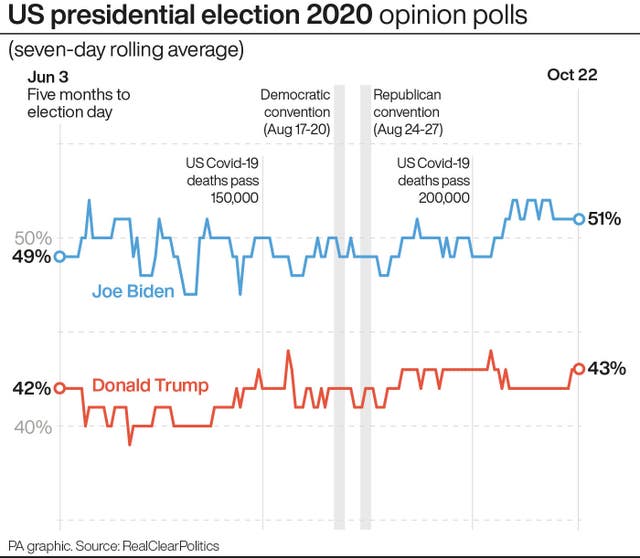
Ben Kentish 10pm - 1am
22 October 2020, 13:54

The allegations were made by officials on Wednesday, 13 days before the election.
US officials have accused Iran of being behind a flurry of threatening but fake emails sent to Democratic voters in multiple battleground states in a late push to sway public opinion and interfere in the presidential election.
Purportedly from far-right, pro-Trump groups like the Proud Boys, the fake emails were apparently aimed at intimidating voters.
John Ratcliffe, the government’s national intelligence director, said the aim was to hurt President Donald Trump in the contest against Democrat Joe Biden but did not elaborate on how.
One possibility is the messages may have been intended to align Mr Trump in the minds of voters with the Proud Boys after he was criticised for failing to unequivocally denounce the group during the first presidential debate.
The threatening emails officials did not lay out specific evidence for how they came to pinpoint Iran but the activities attributed to Tehran would mark a significant escalation in its online espionage.
The announcement was made late on Wednesday at a hastily called news conference 13 days before the election.
The allegations underscore the US Government’s concern about efforts by foreign countries to influence the election by spreading false information meant to suppress voter turnout and undermine American confidence in the vote.
Such direct attempts to sway public opinion are more commonly associated with Russia.
The idea that Iran could be responsible suggested those tactics have been adopted by other nations, too.
Mr Ratcliffe, the Government’s top intelligence official, said: “These actions are desperate attempts by desperate adversaries.”
Along with FBI director Chris Wray, he has insisted the US will impose costs on any foreign countries that interfere in the 2020 election.
He added the integrity of the election is still sound.
“You should be confident that your vote counts,” Mr Wray said.
“Early, unverified claims to the contrary should be viewed with a healthy dose of scepticism.”
The two officials called out Russia and Iran for having obtained voter registration information, though such data is sometimes easily accessible and there was no allegation either country had hacked a database for it.
Iran used the information to push out spoofed emails, officials said, and created a video that Mr Ratcliffe said falsely suggested voters could cast fraudulent ballots from overseas.
The pair did not describe the emails linked to Iran but officials familiar with the matter said the US has linked Tehran to messages sent to Democratic voters in at least four states, including battleground locations such as Pennsylvania, Florida and Arizona.

The emails falsely purported to be from the far-right group Proud Boys and warned “we will come after you” if the recipients do not vote for Donald Trump.
It would not be the first time the Trump administration has said Tehran is working against the Republican president.
An intelligence assessment released in August said: “Iran seeks to undermine US democratic institutions, President Trump and to divide the country in advance of the 2020 elections.
“Iran’s efforts along these lines probably will focus on online influence, such as spreading disinformation on social media and recirculating anti-US content.”
Unlike the U.S., Iran does not interfere in other country's elections. The world has been witnessing U.S.' own desperate public attempts to question the outcome of its own elections at the highest level.1/2 https://t.co/8AOKvIZr1h
— Alireza Miryousefi (@miryousefi) October 22, 2020
A spokesman for Iran’s mission to the United Nations, Alireza Miryousefi, denied Tehran had anything to do with the alleged voter intimidation.
“Unlike the US, Iran does not interfere in other country’s elections,” he tweeted.
“The world has been witnessing U.S.’ own desperate public attempts to question the outcome of its own elections at the highest level.”
Iran’s Foreign Ministry summoned the Swiss ambassador on Thursday over the allegations.
It has overseen American interests in Tehran since the aftermath of the 1979 hostage crisis.
“The Islamic Republic of Iran, while rejecting the allegations and the fake reports, again emphasises that there’s no difference for Tehran which candidate goes to the White House,” the ministry said in a statement.
Mr Trump, speaking at a rally in North Carolina, made no reference to the announcement but he repeated a familiar campaign assertion that Iran is opposed to his re-election.
He promised if he wins another term he will swiftly reach a new accord with Iran over its nuclear programme.
“Iran doesn’t want to let me win, China doesn’t want to let me win,” Mr Trump said.
“The first call I’ll get after we win, the first call I’ll get will be from Iran saying, ‘let’s make a deal’.”
House Speaker Nancy Pelosi and Adam Schiff, the Democratic chairman of the House intelligence committee, said the “disturbing” threats cut to the heart of the right to vote.
“We cannot allow voter intimidation or interference efforts, either foreign or domestic, to silence voters’ voices and take away that right,” they said in a statement.